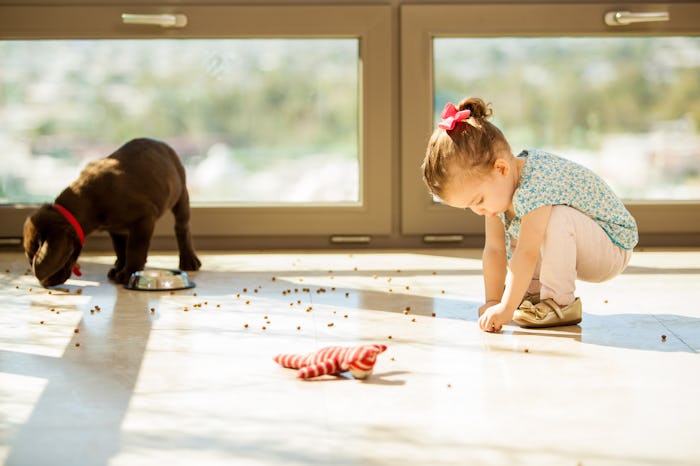Life

What A Dog Trainer Wants You To Know About Kids & Pets
If you're like me and had "furbabies" in your life long before you decided to have kids, you want to do everything you can to ensure that your pets and your baby became friends, and not foes. Or maybe you decided to add a pet to your family after you had kids. Whatever order your pets and kids came into your lives, it's important that you know how to keep all of them safe and happy. With that in mind, there are a few things a dog trainer wants you to know about kids and pets. I mean, why not learn some tips and tricks from the professionals, right?
Romper spoke with Stacey Simison, B.S., a mom and certified dog trainer, who holds a Bachelor's Degree in biology with a concentration in zoology and animal behavior from Ball State University. Simison shared a few of her expert tips for living peacefully with kids and pets; in other words, every parent's dream. When it comes time to bring your baby home from the hospital, Simison recommends taking things slowly. Simison wrote, via email, "You can try to desensitize pets to handling, noise, and erratic movements, by exposing your pets to kids of various ages beforehand. These should be positive experiences, even if it means only a quick 1 - 2 minute-long session at a time." Just like you, your pet won't adjust to having another tiny human being in the automatically. Becoming accustomed to such a drastic change takes time for everyone, including our furry friends.
The American Society for the Prevention of Cruelty to Animals (ASPCA) agrees. Here's what the ASPCA had to say:
"Socialize your dog! Well-socialized dogs make enjoyable, trustworthy companions. Undersocialized dogs are a risk to their owners and to others because they can become frightened by everyday things — which means they are more likely to aggress or bite."
At whatever age, Simison recommends that you start teaching kids how to interact with pets from the start, including how to be gentle and respectful toward your pet. Of course, this takes time and repetition, because kids aren't always great listeners, but it's worth the effort. Simison suggests that petting and holding pets are not often good places to start, either. Instead she recommends the following: "There are so many ways for kids to interact with animals besides touching. They can sing, read, or talk to your pet, can toss treats or use various products that make feeding safer for little hands. As they grow, they can help with feeding, training, or exercising, too."
While your baby and your pet may seem like best buddies, Simison told Romper via email to remember that both pets and children can be unpredictable. It's best to separate them at first, until your child learns how to interact with your pet. Furthermore, you should always supervise even the gentlest pet when they are with your child, for both of their sake. To avoid potentially harmful situations, Simison has two key pieces of advice. She writes, "Always allow the pet a way out. Your pet should never be pinned, laid on, or cornered, etc. They should be allowed to escape an uncomfortable situation."
According to Family Paws Parent Education, supervising your child and pet at all times, and separating them with baby gates when they are eating or playing, sets them both up for positive experiences and success. You shouldn't, however, isolate your pet from the rest of your family. Instead, you should include them in safe ways.
Simison adds, "Remember, just because an animal can tolerate something doesn't mean they should or always will. For example, a baby trying to pet by slapping or pulling hair, or a child who gets into the habit of leaning on a large dog. As your dog ages, they may become arthritic and experience pain. At the same time, your child becomes heavier. All it takes is the kid leaning on the dog, causing pain, and they might get bitten."
For parents of kids and pets, a big worry is that your pet will bite or harm your child. Fortunately, according to Simison, most common situations resulting in bites are completely preventable. She writes, "Kids are commonly bitten because they try hugging or kissing their pet, which can be very intimidating; they handle their pet inappropriately, such as grabbing their collar, tail, fur, or feet; they are running and a dog is over-aroused; they have food or toy and are teasing the pet; or you haven't taught appropriate boundaries to your child or pet."
If your pet becomes aggressive towards your child, you should consult your veterinarian, an animal trainer, or both, before making decisions about how to address their behavior or re-homing your pet. Simison writes, "There are tons of medical issues that can cause behavior issues, so it's important to rule out medical issues first. A trainer can help, too, but if there's a medical issue, too, training won't help, without medical treatment, too."
For more information about creating a safe home for your kids and pets, Simison recommends visiting Family Paws Parent Education online or call their Dog and Baby Support hotline at 1-877-247-3407.
Check out Romper's new video series, Romper's Doula Diaries:
Watch full episodes of Romper's Doula Diaries on Facebook Watch.